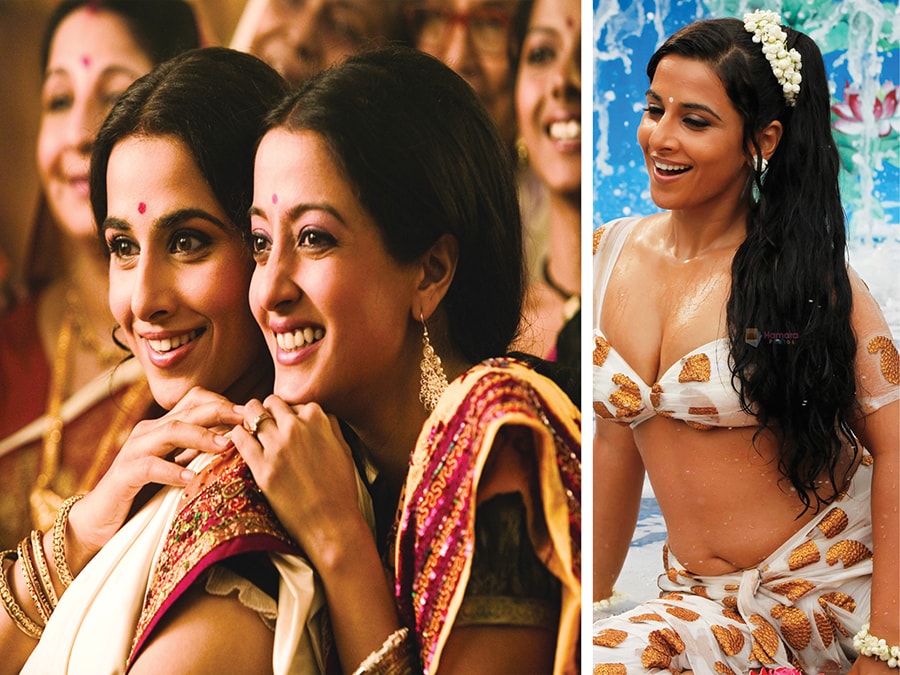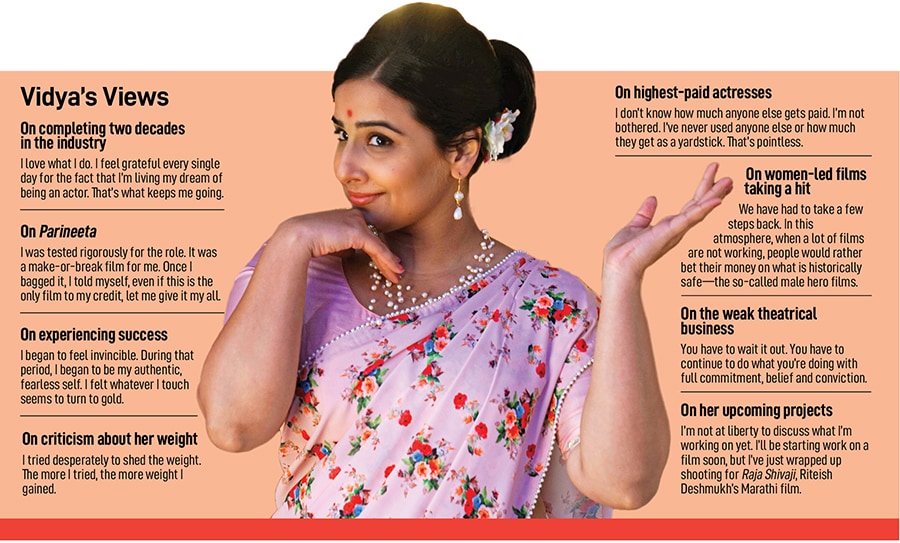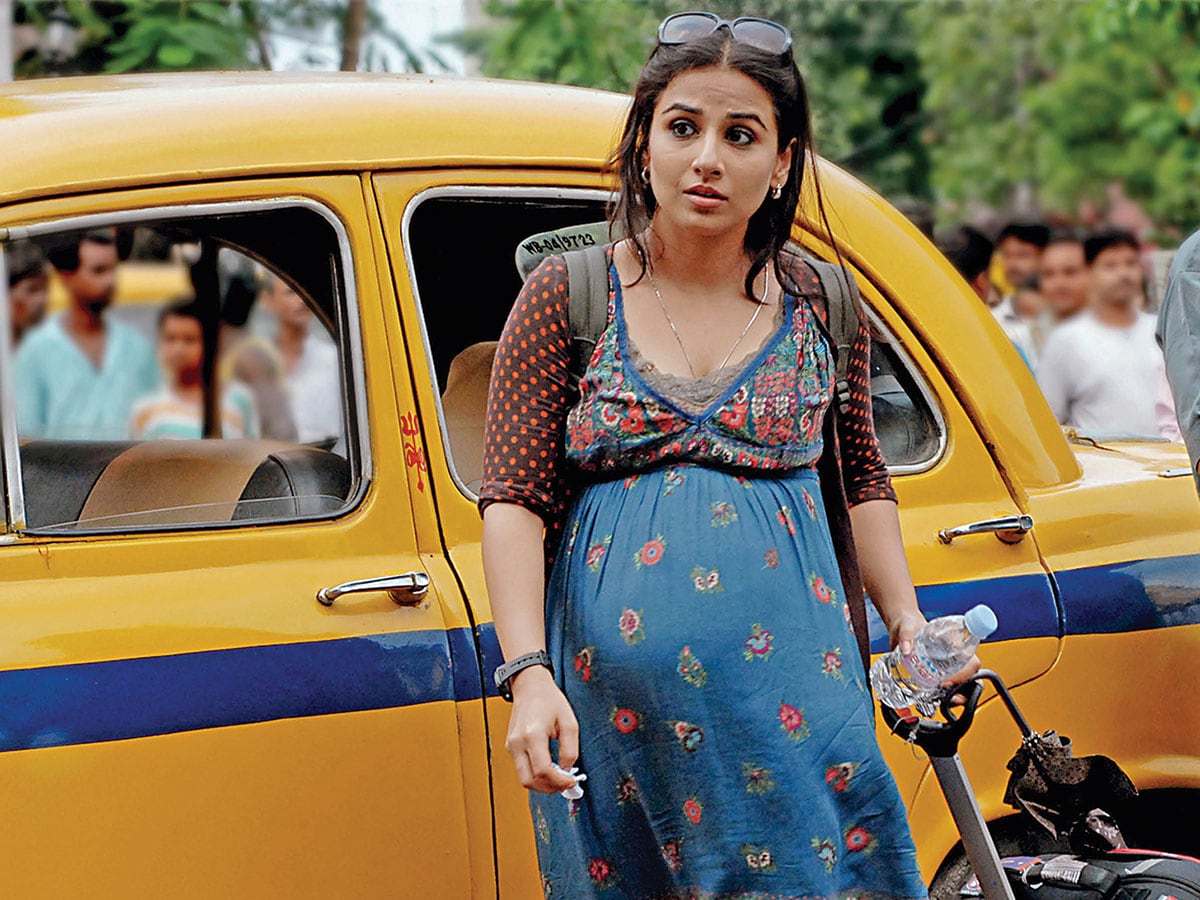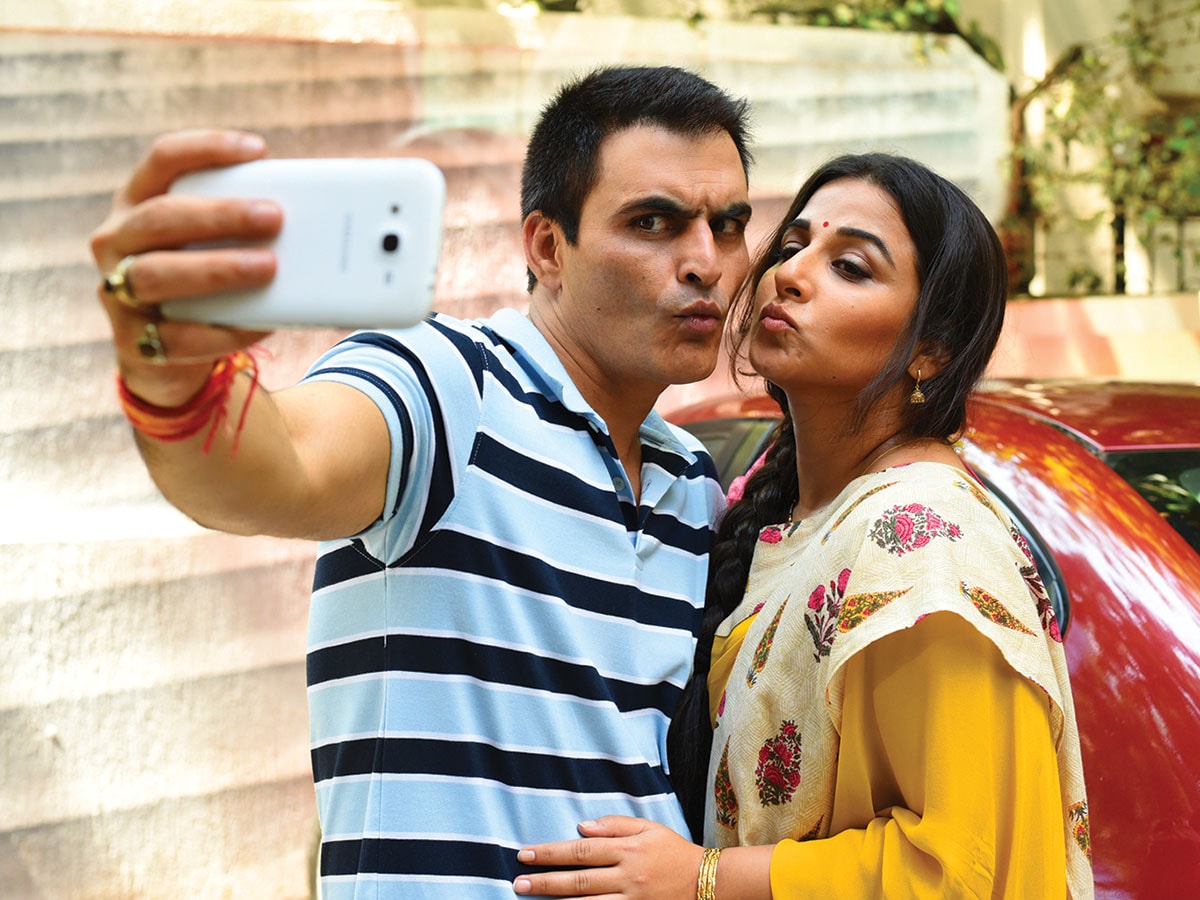Vidya Balan: The art of surviving and thriving
Two decades in the competitive Hindi film industry have taught the actor about the impermanence of everything. Despite the scrutiny, she has not been afraid to experiment and break the mould


Anurag Basu could not wrap his head around the fact that Vidya Balan had refused an offer to star in Kyunki Saas Bhi Kabhi Bahu Thi (2000). The daily soap opera, produced by Balaji Telefilms, was the biggest show of the time, topping the popularity and ratings charts. “You are crazy… not everyone can become a Shah Rukh Khan,” the filmmaker told Balan, who was adamant on getting into films, having previously starred in the family sitcom Hum Paanch.
Born into a Tamil Brahmin family in Chembur, Mumbai, the sociology graduate from St Xavier’s College was eventually launched by the late director Pradeep Sarkar nearly five years later in Parineeta (2005). When Forbes India met her at a studio in Khar on a rainy afternoon in July, the actor had completed 20 years in the Hindi film industry. And Khan had no National Award to his name till then—the announcement of him sharing the award for Jawaan with Vikrant Massey (for 12th Fail) came a month later—as opposed to Balan, who won her first for The Dirty Picture (2011) over a decade earlier.
“This hunger, this madness, this passion for what I do… I love what I do. I feel so grateful every single day for the fact that I am living my dream of being an actor,” Balan tells Forbes India about what has kept her going for the last two decades.

She thought of becoming an actor when she was eight-and-a-half years old. A schoolgirl then, she didn’t know if it was a passing fancy or whether it was going to become a dream with legs. But she began pursuing it wholeheartedly. Balan appeared in several advertisements and music videos. Prior to Hum Paanch, she had even shot for a television show for eight months that did not see the light of day.
The start was anything but smooth. Before Parineeta, Balan had bagged a Malayalam film with a superstar that got shelved. The fallout was so severe that she was replaced from a lot of films in the South that had signed her since she was “one of them, a Tam-Brahm girl from Mumbai who spoke their language”. Subsequently, the narrative that she brought bad luck and was jinxed became par for the course.
“In retrospect, I think I was being prepared for something. I was being prepared to handle this, because if I had seen success immediately, who knows, maybe I wouldn’t have been able to handle it,” says the actor, who become synonymous for heralding women-oriented films with critical and box office acclaim.
One of those female-led movies that took her out of her comfort zone was The Dirty Picture, which earned more than ₹100 crore at the box office. Director Milan Luthria had met Balan a couple of times earlier and found something “tender, vulnerable and emotional” in her. Both expressed a desire to work with each other, but nothing worked out for almost three years.
When Luthria thought of making a film based on the life of Silk Smitha, an actor from the South known for her bold roles, he believed Balan was the obvious choice. “But there was a lot of opposition. They wanted someone who had a stronger image, of a sex symbol or a bolder woman,” he says. But he refused to budge. “I told the producers that if I cannot cast Vidya, I won’t make the film. You can get someone else to direct it.”
Though he overcame that hurdle, he had to face a bigger challenge: Of convincing Balan to take up the offer. She was caught off guard when he narrated the story to her. “This is impossible for me to say yes to. Why can’t we do something else?” she responded.
Luthria requested the actor to give it some time and thought. “I promise that I will not make it appear cheap or vulgar,” he told her. After a month, Balan, who had by then discussed the role with her family, confessed to being nervous about doing the film. The filmmaker reassured the actor and said, “then something karmic happened”—she decided to dive in and gave it her all.
“Vidya was almost annoying,” says Luthria. “She would land up at office every day to discuss her costumes and scenes. She would call and ask: ‘Can I drop by for coffee today?’ I would sometimes have to tell her that I am not in office. She was that devoted… she had a lot of questions about how I saw the character.”

Another filmmaker who had to convince Balan to come on board was R Balki, who approached her to play Amitabh Bachchan’s mother in Paa (2009). He says he wrote the film keeping Balan in mind. “When I first told her the idea, she looked scared. When I explained the script, she got excited, but even more scared,” says Balki, adding that she even mentioned that she will be seen as Nirupa Roy, an actor who played Bachchan’s on-screen mother in several hits in the 1970s and 1980s.
Balki tried to persuade her, saying Bachchan was playing a 13-year-old with progeria, a genetic disorder. Balan remained doubtful. That’s when the director told her to come and see some makeup tests he had organised for Bachchan. “When he walked into the room with that look, she got shocked. She said I am doing this film,” he recalls.
Once she understood the character, she pulled it off without breaking a sweat. “As an actor, Vidya can be subtle, candid and natural… she can make you cry on sets when you watch her crying. She understands the nuances of her character. I remember Amitabh Bachchan standing there… and she treated him exactly like a child,” recalls Balki.

With Paa, The Dirty Picture, No One Killed Jessica (2011) and Kahaani (2011), Balan enjoyed a terrific run at the box office. “During that period, I began to be my authentic, fearless self,” she says. Though she didn’t do anything different with her craft, the success, she admits, did corrupt her mind in some ways. “I began to feel invincible. As grounded as I would have liked to be, at some point, I felt, whatever I touch seems to turn to gold,” continues the actor, who was awarded the Padma Shri in 2014.
As a consequence, she suddenly started looking at box office collections. “I began to focus on the wrong things. I began to chase numbers. For me, performance was the only thing that I was ever focussed on,” she explains.
Through the failure of her next few films, Balan understood that she is not singularly responsible for the fate of her movies. The realisation also dawned upon her that the projects didn’t turn out the way she had hoped them to. The box office lull for five to six years did not have a bearing on her professionalism though.
“I met Vidya after Begum Jaan (2017) had released… a month before Tumhari Sulu’s shoot. Anyone else would have been tentative [given the film’s debacle], but she did not bring that to my set at all. She is so talented that you can’t write her off,” says Suresh Triveni, who directed the actor in Tumhari Sulu and Jalsa (2022).
Agrees Luthria, who points out that highs and lows are a part of every professional’s life. “This is not an industry with a gradual graph. Yes, Vidya may have gone through her ups and downs, but there’s a lot still to come,” he says.
Scrutiny was not alien to Balan, who had faced a barrage of criticism for her fashion and weight. “I was going through health issues. I felt unloved, and, therefore, I think I was probably being unloving towards myself,” she confesses. Though she didn’t try hard to fit in, she desperately tried to shed the weight. “The more I tried, the more I gained,” she adds. Working with a healer for the last 14 years, she continues, has given her strength and clarity.

Pratik Gandhi, who starred with Balan in Do Aur Do Pyaar (2024), is all praise for his co-actor for the way she handled the backlash. “Body shaming was an integral part of her life and it bothered her for the longest time. But she dealt with it in a positive way and used it to her advantage. In today’s time, where we seek validation for each and everything—online and offline—someone who has led her life with her rules and conviction is an inspiration. Especially in our field where looks matter a lot,” he says.
Balki encouraged Balan to play to her strengths. He remembers a conversation he had with the actor on a flight where he told her that her saree was her biggest asset. “You should be the most modern woman in a saree and that is my desired image of you. She was like that in Parineeta… there was a classical beauty to her. That is how I saw her in Paa as well,” he says. “I told her I don’t think a Kanjeevaram saree will look cooler on anyone more than you. You are the classic Indian woman that every guy is aspiring to meet.”
Balan was not afraid to experiment and break the mould though. The most drastic makeover happened when she turned into the sultry Silk Smitha for The Dirty Picture. “It was so different from anything I had done before. It was exciting for me as an actor that I was getting to do something that I had always wanted to do, but had not got a chance till then,” she says.
The actor had close to nine looks in the film—from that of a struggling young girl to the time she was puffy and bloated. “There were more than 105 costumes… and she diligently came for all her fittings and look trials. I kept joking that I spent more time outside her van than on the sets, because I wanted every hair in place, and everything to match correctly—the necklace, bangles, blouse and skirt,” says Luthria. “I thought Vidya would get irritated because I would suggest a lot of changes, whether it was trying out a new hairstyle or softening her makeup. But she kept laughing through it.”
The director adds that Balan was a thorough professional who learnt how to smoke and worked hard on her dancing. “We had a whole space setup for her with a mirror. She did not ask for a closed set ever. Naseeruddin Shah and Vidya would learn the steps for two hours,” he says.
Triveni is in awe of Balan’s commitment. The actor played a radio jockey—for the second time in her career after Lage Raho Munna Bhai—in Tumhari Sulu. “I wanted her to break the pace of her dialogues, speak fast and get a Bambiyaa accent with fractured Hindi,” he says. “Vidya is fluent with her words and diction. She worked extremely hard with my co-writer Vijay Maurya and did a lot of workshops to get it right. I narrated the script of Tumhari Sulu at least 11 times to her and she kept practising after every narration. She is something else on sets.”
It’s not just her sincerity to her craft that has stayed with Triveni, but also the faith that a senior actor like her showed in the rookie filmmaker. The ad filmmaker from Chennai first met Balan when he came to Mumbai in 2004 prior to the release of Parineeta. As an associate, he was doing a documentary for BBC on film directors and was asked to interview the actor as part of the assignment. Having watched her in advertisements and music videos, and being enamoured by her screen presence, he boldly told Balan after the interview: “I will come to you with a script one day.”
Their paths did not cross for the longest time till he had made a name for himself in the advertising world. When he expressed a desire to get into filmmaking, Kedar Teny, the marketing head of McDonald’s India, one of Triveni’s clients, suggested that he meet his sister-in-law. “She turned out to be Vidya Balan,” says the director, who got an immediate appointment with the actor, but did not have a story to pitch. “I sourced stories from my friends and told her one [not Tumhari Sulu’s]. We worked on an idea for six months, but that did not materialise. I was heartbroken,” he adds.
The dejection of seeing his dream of working with Balan fade away lasted only for a short while. On his way back home, he told the actor that he had another story and dropped the idea of Tumhari Sulu. He took a break from work for a month and wrote the film, customised for Balan.
“When I read the script to her, Vidya immediately said yes. I was so naïve that I asked her to sign it and took a photo,” says Triveni, adding that he rues asking her to sign a letter of intent as well despite not having a producer on board. It took him eight months to find one as he had no Bollywood connections. “Vidya was extremely patient with me throughout that journey. She stood by me and guided me. She never made me feel as if I was a first-time director. And when the film took off, it was the warmest journey ever. She totally surrendered to the character. She is a director’s actor. Vidya spoils you,” he adds.
Much like Triveni, Gandhi was witness to Balan’s largesse when they collaborated on Do Aur Do Pyaar. He says the senior actor did not make him feel that she was a star even once. “It was a beginning for me in mainstream cinema. I was just a few films old, but she made things comfortable for me on and off sets. On top of that, we were playing husband and wife, so that physical proximity had to translate well on screen,” he says. “I give a lot of credit to Vidya because she made things easy, not just for me, but largely on sets… that’s how she works. Whenever I felt we could approach a scene or line differently, I discussed it with her. I did not feel the pressure of talking to someone senior.”
In the last two decades, Balan has earned her stripes as an artiste with no paucity of work. Her last film, Bhool Bhulaiyaa 3 (2024), was a blockbuster, earning more than ₹400 crore worldwide.
It’s not easy for someone—more so a female artiste—to survive and thrive for so long in an industry where fortunes can change every Friday. Balan, despite all that has been thrown at her, has managed to do that. And she hopes to take on more diverse roles.
“Her choice of films has been good, and she is still hungry to perform,” says Balki, who also worked as a writer on Mission Mangal (2019), a film starring the actor. “I am looking forward to her breaking the mould within her personality… she has a habit of doing that every two years.”
Surviving in this business is a mixture of talent and temperament, explains Luthria. “The three things that Vidya brings to her work are her talent, charisma and temperament,” he says.
According to Triveni, apart from talent, one requires discipline and a strong work ethic for a longstanding stint in the competitive film industry. He says if the call time is 9 am, Balan is in the vanity van by 7 am. “If she is late even by a minute, she apologises. Her talent is a given, but her dedication and discipline stand out,” he says. “What also matters is conviction. From the time she decided to spearhead female-led films, she stuck to it.”
Agrees Gandhi, who attributes her success and longevity to her courage. “Vidya has faced a lot of challenges to sustain and to get work. She has handled herself well despite the pressure… she took decisions driven by her passion and belief. One has to be extremely fearless when it comes to taking risks, when it comes to creating characters in different genres,” he says.
Over the years, Balan has learnt to deal with the vagaries of the profession. One way of doing that is by hibernating between shooting for films. “I lead a very private life. That has helped me maintain my calm, stay stable—mentally, emotionally—and live my life,” she says.
Luthria experienced this first-hand during the making of The Dirty Picture. The first thing he noticed, he says, is that Balan is an intrinsically happy person, there are no hang-ups and nothing irritates her. “Vidya does not have a temper… she is not egoistic. She is an easy actor to work with,” he says. “The second is that she has no distractions. She does not carry her phone and you will not see people around her. She is completely switched off. It’s phenomenal for an actor to do that in today’s times. And the third is that she is a strong person.”
Gandhi says Balan is a jovial person whose laughter is contagious. “She can easily switch-on and switch-off from her character,” he adds. “She’s a prankster. She loves trying out different cuisines and working out.”
Balan is constantly joking on sets and is great with puns and poor jokes, lets on Triveni. “She is good at pulling people’s legs and playing pranks. She wants to have fun. She is gracious and warm… she will never make you feel like she is Vidya Balan,” he says.
Balki concurs. “She is one of the simplest people to work with, she is not a typical heroine.”
That was evident after Forbes India’s interview and shoot with her. Balan spent nearly half an hour walking in a small lane amid a mild drizzle in Khar, taking photos and videos, oblivious to the gaze of a few onlookers and her celebrity status. The last two decades have taught Balan about the impermanence of everything—fame, success, failure, problems, friendship. “I have learnt to appreciate the transient nature of everything and value being an actor,” she says.
First Published: Sep 23, 2025, 11:56
Subscribe Now